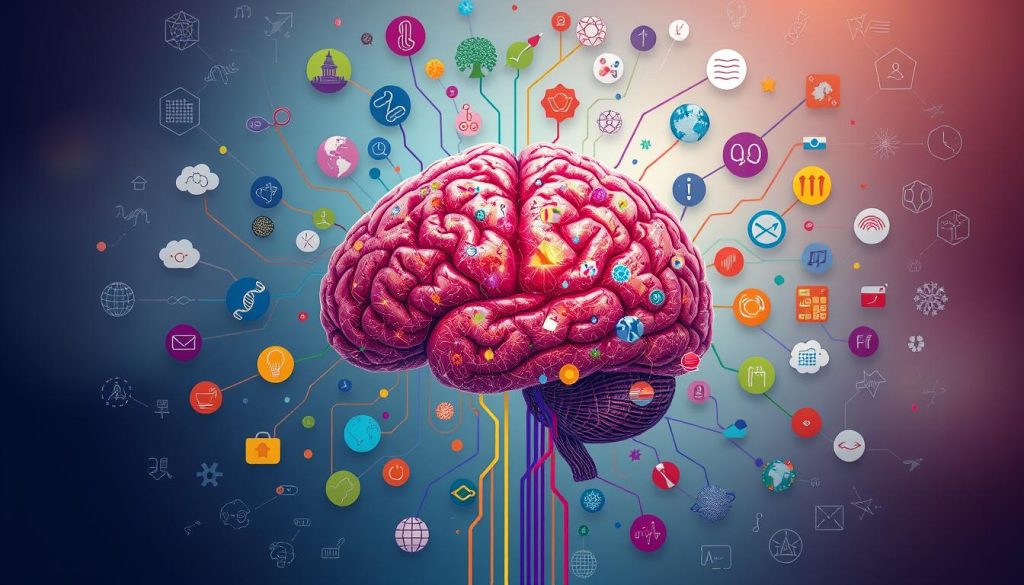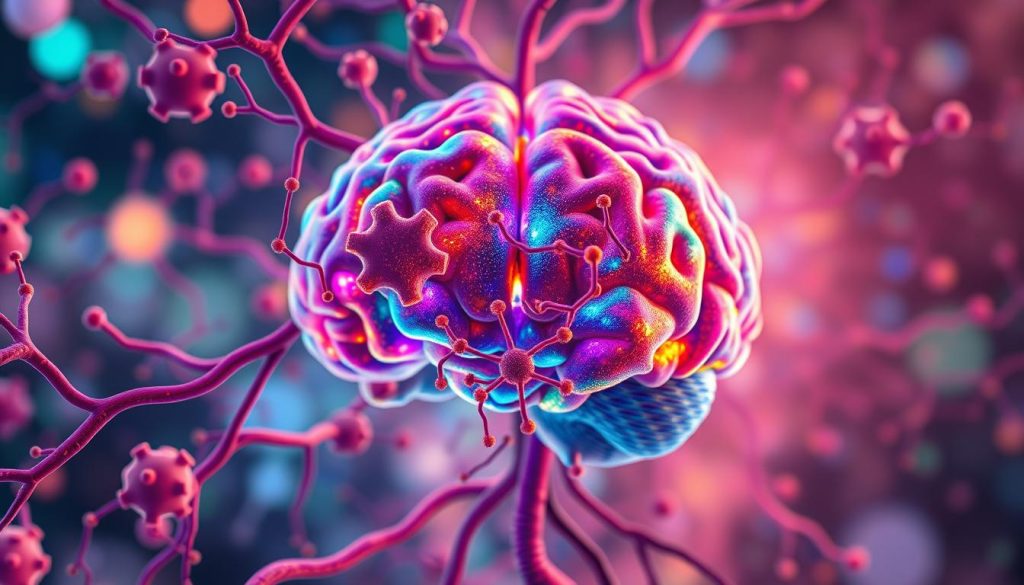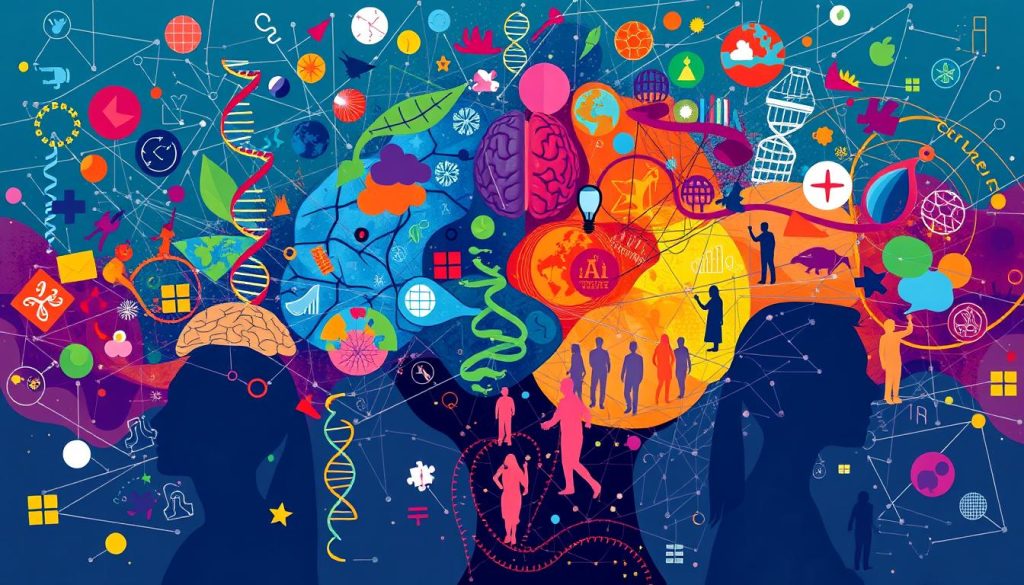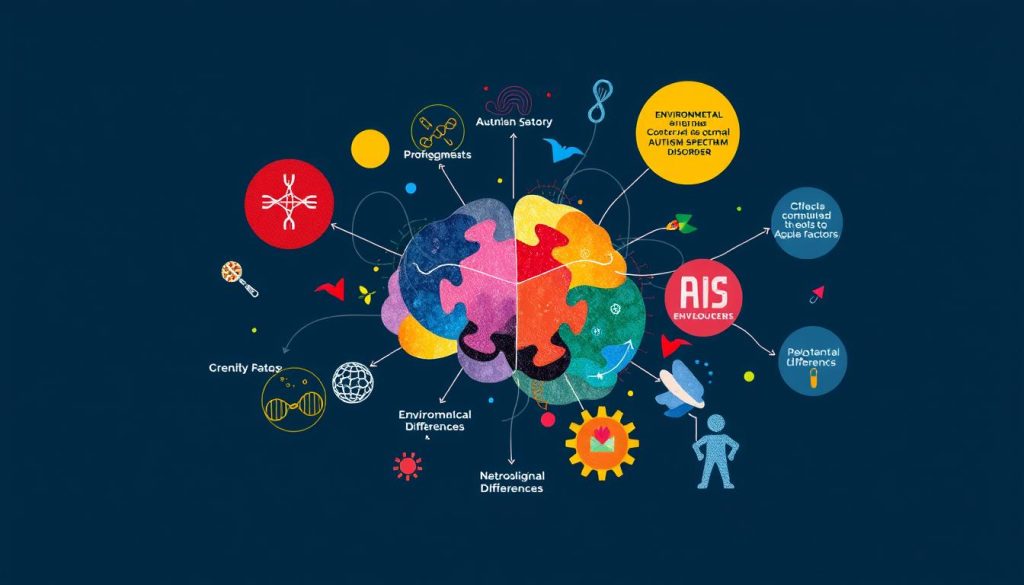Scientists are working hard to understand autism spectrum disorder. They are looking at many different things to find out why it happens. Knowing what causes autism is important for families and doctors.
There are many things that can lead to autism, like genes and the environment. Finding one cause is hard, but it helps us find better ways to help. By looking at all these factors, we can improve care for people with autism.
Understanding Autism Spectrum Disorder: A Complex Neurodevelopmental Condition
Autism Spectrum Disorder (ASD) is a complex condition that affects how people interact and communicate. It also impacts their behavior. Each case of ASD is unique, influenced by various factors. Let’s dive into the key aspects of ASD to understand it better.
Defining Autism and Its Core Characteristics
ASD is characterized by challenges in social interaction and communication. It also includes repetitive behaviors. These traits vary in severity, affecting people differently. The way autism affects the brain is key to understanding these characteristics.
The Spectrum Nature of Autism
Autism is a spectrum disorder, with a wide range of symptoms and severity levels. Some people need a lot of support, while others can live independently. This shows how complex ASD is and why each person needs a unique approach to support and treatment.
Historical Understanding and Modern Perspectives
Our understanding of autism has changed a lot over time. Early beliefs were wrong, and now we see ASD as a neurodevelopmental condition. Today, research focuses on the brain mechanisms of autism, helping us understand its causes and how to help.
| Past Understanding | Modern Perspective |
|---|---|
| Single condition | Spectrum of disorders |
| Purely behavioral | Neurodevelopmental origin |
| Limited treatment options | Diverse support strategies |
What Is The Cause Of Autism: Multiple Factors at Play
Autism is a complex condition with no single cause. Scientists have found many factors that contribute to it. The mix of genetic predisposition and environmental influences is key in autism spectrum disorder.

Genetic causes of autism are a big part of the risk. Studies show that some gene variations raise the chance of autism. These genetic factors can be passed down or happen on their own.
Environmental triggers for autism also matter. Researchers have found that prenatal exposure to certain substances, maternal infections, and pregnancy complications may raise autism risk in children.
| Genetic Factors | Environmental Factors |
|---|---|
| Gene mutations | Prenatal infections |
| Inherited variations | Maternal stress |
| Epigenetic changes | Exposure to toxins |
To understand autism, we must look at both genetic and environmental factors. This approach helps researchers find better ways to detect and treat autism early. It improves life for those with autism.
Genetic Foundations of Autism Development
Research into the genetic causes of autism has grown a lot in recent years. Scientists have learned a lot about the genetic factors that lead to autism spectrum disorder (ASD). Genetic factors are very important in autism, with studies showing it can run in families.
Key Genes Associated with Autism Risk
Researchers have found several genes linked to a higher risk of autism. These genes help with brain development, how neurons talk to each other, and how the brain works. Some of the most studied genes include:
- SHANK3
- CHD8
- PTEN
- MECP2
Hereditary Patterns and Family History
Studies show that autism often happens in families. Siblings of children with ASD are more likely to have it than others. This shows that genetics play a big role in autism.
Genetic Mutations and Their Impact
Genetic mutations can greatly affect the risk of autism. These can be passed down or happen on their own. Scientists are looking for biomarkers for autism to help diagnose and treat it early.
| Mutation Type | Description | Impact on Autism Risk |
|---|---|---|
| Copy Number Variations | Large deletions or duplications of DNA segments | Can increase risk significantly |
| Single Nucleotide Polymorphisms | Changes in single DNA building blocks | May contribute to subtle differences in autism traits |
| De Novo Mutations | New genetic changes not present in parents | Can lead to sporadic cases of autism |
Environmental Risk Factors During Pregnancy
Pregnancy is a key time for a baby’s growth. Many things in the environment can affect this growth. Studies show that things like the mom’s health and outside exposures play a big role.

Stress in pregnancy is a big worry. High stress can change how a baby’s brain grows. This might make the risk of autism higher.
Chemicals in the air and water are also harmful. Pesticides, air pollution, and chemicals from factories have been linked to autism. These toxins can get into the baby’s brain while it’s growing.
Getting sick during pregnancy is another risk. Viruses like rubella can cause problems. They can make the baby’s immune system react in ways that affect brain growth.
| Environmental Factor | Potential Impact |
|---|---|
| Maternal Stress | Altered neurotransmitter balance |
| Chemical Exposure | Disrupted neural growth |
| Prenatal Infections | Immune-mediated brain changes |
Knowing about these risks is important. It helps us find ways to prevent autism. By understanding these risks, we can help future babies have a better start in life.
Prenatal Development and Autism Connection
Research is focusing on how prenatal events might affect autism risk. Scientists are looking into how pregnancy can influence autism spectrum disorder (ASD) in children.
Critical Periods of Brain Development
Brain development in the womb is complex. There are specific times when growth is most important. For example, the first trimester is key for neuron formation.
The second and third trimesters are important for neuron migration and connection. These periods are sensitive to prenatal influences on autism.
Maternal Health Influences
A mother’s health during pregnancy affects fetal brain development. Factors like stress, nutrition, and toxins are risk factors for autism. Maternal infections or immune system activation during pregnancy may also increase ASD risk.
Pregnancy Complications and Risk Assessment
Certain pregnancy complications are linked to higher autism risk. These include:
- Gestational diabetes
- Preeclampsia
- Extreme premature birth
- Low birth weight
Understanding these prenatal influences helps in developing early intervention strategies. It’s important to note that while these factors may increase risk, they don’t necessarily cause autism.
| Pregnancy Factor | Potential Impact on Autism Risk |
|---|---|
| Maternal Infections | May increase risk |
| Gestational Diabetes | Associated with higher risk |
| Maternal Nutrition | Can influence brain development |
| Environmental Toxins | Possible increase in risk |
Early Life Experiences and Autism Risk
Early life experiences shape a child’s development. For autism spectrum disorder (ASD), some factors in infancy and early childhood may increase risk. Knowing these environmental triggers can help parents and healthcare providers act early.

Birth complications are linked to autism risk. Premature birth, low birth weight, and oxygen issues during delivery can affect brain development. These can lead to neurological differences seen in ASD.
Early childhood illnesses, like those affecting the brain, might also play a role. High fevers or inflammation in the central nervous system could disrupt normal development. While not all children with these illnesses develop autism, they may be at higher risk.
Environmental exposures in early life are also being studied. Certain chemicals, pollutants, or toxins might influence brain development. Researchers are looking into how these exposures could trigger autism.
| Early Life Factor | Potential Impact on Autism Risk |
|---|---|
| Birth Complications | May affect brain development |
| Early Childhood Illnesses | Could disrupt developmental processes |
| Environmental Exposures | Might influence neural pathways |
While these factors may increase autism risk, having one or more does not mean a child will definitely be diagnosed with ASD. Autism is complex, with many factors at play. Research is ongoing to understand how genetics and early life experiences interact in autism development.
The Role of Brain Structure and Function
Brain differences are key in autism spectrum disorder. Research shows unique brain patterns in autism. These findings help find autism biomarkers for early diagnosis and treatment.
Neurological Differences in Autism
Brain scans reveal subtle differences in autism. Some areas might be bigger or smaller than usual. The amygdala, which handles emotions, often differs in size.
The cerebellum, important for movement and language, also varies. These differences are important to understand.
Brain Connectivity Patterns
Autism brains have different connections between areas. Some connections are stronger, while others are weaker. This affects how the brain processes information.
It might explain challenges with sensory input or social cues. Studying these patterns helps us understand autism better.
Neurotransmitter Involvement
Chemical messengers in the brain work differently in autism. Levels of serotonin, dopamine, and GABA often change. This impacts mood, behavior, and how we process sensory information.
Studying these imbalances helps find autism biomarkers. It could lead to new treatments targeting specific chemicals.
Understanding brain differences in autism is complex. Each brain is unique. But these patterns offer insights into autism’s biology. They guide research and support for autism spectrum disorders.
Immunological Factors and Autism Development
The immune system is key in brain growth. Scientists are looking into how it might link to autism spectrum disorder (ASD). This research helps uncover autism risk factors and environmental triggers.

Maternal immune activation in pregnancy is a major focus. When a mother’s immune system is activated, it might affect her baby’s brain. This could raise the child’s autism risk.
Autoimmune conditions also seem to increase ASD risk. Mothers with conditions like rheumatoid arthritis or type 1 diabetes might face higher risks. This shows that autoimmune factors could be autism triggers.
Studies have found certain immune molecules linked to autism. Cytokines, proteins in immune signaling, are different in some ASD individuals. This hints at an immune system connection to autism.
Grasping these immunological factors could lead to new ways to detect and treat autism early. By understanding immune-related autism risks, researchers aim to support brain health and lower ASD risk.
Epigenetic Influences on Autism Expression
Epigenetic factors in autism are key in shaping how genes work without changing DNA. They connect our genes to the environment, affecting how autism shows up.
Environmental Modifications of Gene Expression
Gene-environment interactions in autism are complex. Things like stress, diet, and toxins can change how genes work. These changes can impact brain growth and function, possibly leading to autism.
For instance, some chemicals in pregnancy might change gene expression in the fetus. This could raise the risk of autism.
Reversible Genetic Changes
Epigenetics also shows that some genetic changes can be reversed. Unlike DNA mutations, these changes can be undone. This gives hope for new treatments.
Scientists are looking into ways to reverse harmful epigenetic changes in autism. This could lead to treatments that address autism’s causes at a molecular level.
Learning about epigenetic factors in autism opens up new research and treatment paths. By studying how genes and environment interact in autism, we can find better ways to prevent and treat it. This knowledge helps families and healthcare teams make better choices for autism care.
Parental Age and Autism Risk Assessment
Researchers are studying how parental age affects autism risk. They found that the age of both parents at conception is important. This could be linked to the genetic causes of autism.
Children born to older parents might have a slightly higher chance of getting autism. This shows how genetics and environment work together in autism.
Studies show that older parents, over 35 for mothers and 40 for fathers, have a higher risk. Scientists think this might be because older parents have more genetic mutations. These mutations could affect how a child’s brain develops.
| Parental Age | Relative Autism Risk |
|---|---|
| Mother < 30, Father < 35 | Baseline |
| Mother 30-34, Father 35-39 | Slightly increased |
| Mother 35+, Father 40+ | Moderately increased |
Even though older parents have a higher risk, most kids don’t get autism. Parental age is just one part of the puzzle of what causes autism.
Metabolic Factors Contributing to Autism
Recent studies have shown how metabolic factors play a part in autism spectrum disorder (ASD). They look into how biochemical processes link to autism’s neurodevelopmental mechanisms.
Biochemical Pathways
Scientists have found several biochemical pathways linked to autism. These include neurotransmitters, energy metabolism, and oxidative stress. Problems in these areas can impact brain development and function, leading to ASD symptoms.
Research on autism biomarkers has found metabolic differences between those with ASD and typical individuals. These findings suggest metabolic irregularities could be early signs for autism diagnosis and treatment.
Metabolic Disorders Connection
Some metabolic disorders are linked to a higher risk of autism. For instance, mitochondrial dysfunction, which affects energy production, is seen more in ASD individuals. This shows how metabolism and neurodevelopment are connected.
- Phenylketonuria (PKU): A rare genetic disorder affecting amino acid metabolism
- Creatine deficiency syndromes: Disorders impacting energy metabolism in the brain
- Purine metabolism disorders: Conditions affecting DNA and RNA synthesis
Understanding these metabolic factors gives us insights into autism’s neurodevelopmental mechanisms. By studying these connections, researchers hope to create better interventions and treatments for ASD.
Modern Research Directions in Autism Causation
Scientists are making strides in understanding what causes autism. New studies explore the complex web of factors behind autism spectrum disorder etiology. Researchers now focus on early-life exposures and prenatal conditions that might play a role.

One key area of study is the impact of air pollution on developing brains. Maternal health during pregnancy is also under scrutiny. Scientists are looking at how immune system issues, metabolic conditions, and inflammation might increase autism risk.
Genetic-environment interactions form another critical research area. Large-scale studies like CHARGE, MARBLES, and EARLI are digging deeper into these connections. They’re examining how genes and surroundings work together in autism development.
The role of prenatal vitamins and supplements is gaining attention too. Researchers are investigating whether these nutrients might help reduce autism risk. This work could lead to new prevention strategies.
As we uncover more about what causes autism, hope grows for better interventions. Each discovery brings us closer to improving lives affected by this complex condition.
Prevention Strategies and Risk Reduction
Knowing what increases the risk of autism can help parents and doctors. We can’t stop all cases, but some steps might help.
Prenatal care is very important. Pregnant women should stay away from harmful chemicals and pollutants. They should also get regular check-ups and eat well.
Our lifestyle choices can affect autism risk. Keeping a healthy weight, not drinking alcohol or smoking, and managing stress are good. Some research shows that folic acid supplements might also help.
Act fast if you see signs of developmental delays in your child. Early diagnosis and treatment can make a big difference.
| Prevention Strategy | Potential Impact |
|---|---|
| Prenatal vitamins | May reduce risk by up to 40% |
| Avoiding environmental toxins | Can lower risk of developmental issues |
| Maternal stress management | May reduce risk of neurodevelopmental disorders |
| Early intervention | Improves outcomes for children with ASD |
While these steps might lower risk, they don’t promise prevention. ASD is a complex issue with many factors. Always talk to healthcare experts for advice tailored to you.
Early Detection and Intervention Importance
Spotting autism early can make a big difference. Doctors now look for autism biomarkers, which are signs that show up before typical symptoms. These clues help catch autism sooner, giving kids a head start on getting help.
Understanding the neurodevelopmental mechanisms of autism is key. It helps create better ways to support children with autism. Early intervention can improve language skills, social interactions, and daily living abilities.
Every child with autism is unique. That’s why it’s important to tailor treatments to each child’s needs. By starting early, families can work with experts to create plans that fit their child best. This approach can lead to better outcomes and a brighter future for children on the autism spectrum.
Remember, early detection doesn’t just help the child. It also supports families by giving them tools and knowledge to navigate their journey. With the right help at the right time, children with autism can reach their full potentials.
FAQ
Q: What is the primary cause of autism?
A: Autism Spectrum Disorder (ASD) doesn’t have a single cause. It’s thought to come from a mix of genes and environment. Studies show many genes and environmental factors play a part in autism.
Q: Are vaccines a cause of autism?
A: No, vaccines don’t cause autism. Many studies have proven this. The first study linking vaccines to autism was wrong and has been removed. Vaccines are safe and protect kids’ health.
Q: Can autism be prevented?
A: We can’t prevent autism yet. But, we can lower some risks. Healthy prenatal care and avoiding harmful exposures during pregnancy help. Early help can also improve life for those with autism.
Q: Is autism genetic?
A: Yes, genes are a big part of autism. But, having certain genes doesn’t mean you’ll get autism. Genes and environment work together to cause autism.
Q: Can environmental factors cause autism?
A: Environmental factors can’t cause autism alone. But, they can increase risk in people with certain genes. Things like chemicals in pregnancy and infections can raise risk.
Q: At what age can autism be diagnosed?
A: Autism can usually be diagnosed by age 2. But, some signs might show up earlier. Early checks start at 18 months. Some people might not get diagnosed until later in life.
Q: How do brain differences relate to autism?
A: People with autism often have different brains. Their brains might be wired differently or have different sizes. These differences help explain autism’s symptoms.
Q: What role does epigenetics play in autism?
A: Epigenetics is key in autism research. It’s about how environment affects gene expression. This helps us understand how genes and environment interact in autism.
Q: Can diet affect autism risk or symptoms?
A: Diet doesn’t cause or cure autism. But, it can affect health and symptoms. Some people with autism might have special dietary needs. Always talk to a doctor before changing your diet.
Q: Are there any known biomarkers for autism?
A: Researchers are looking for autism biomarkers. But, we don’t have one yet. They’re exploring genetic markers, brain scans, and blood tests. These could help diagnose and treat autism better in the future.


















